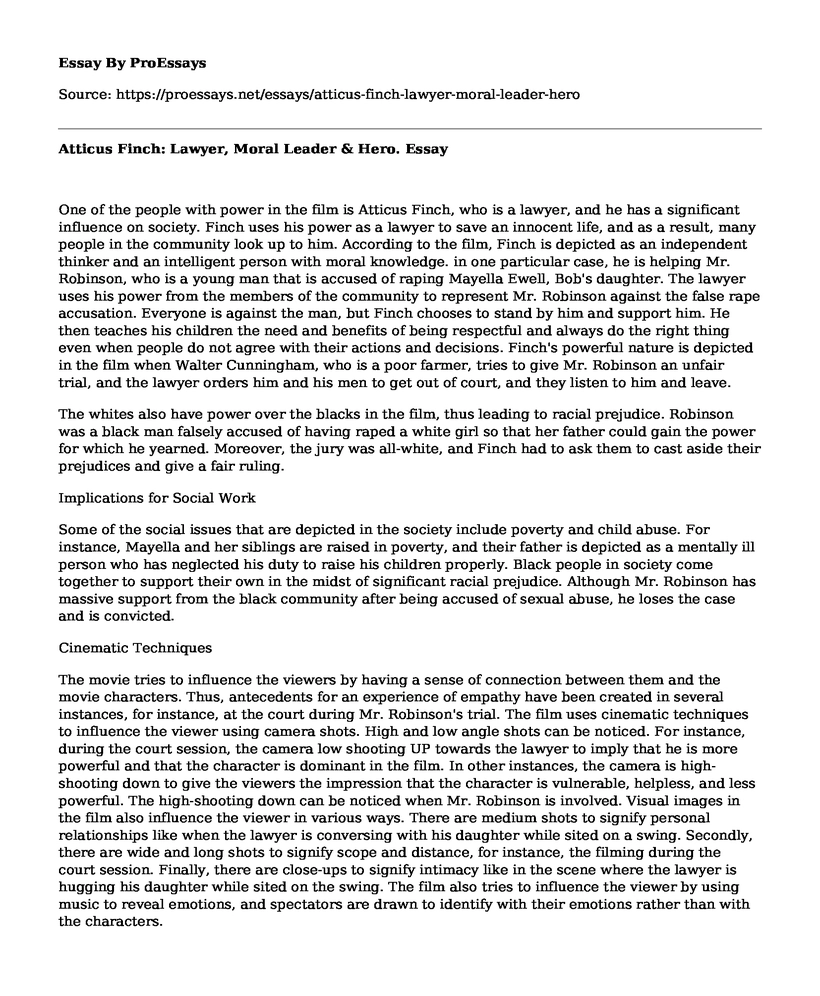One of the people with power in the film is Atticus Finch, who is a lawyer, and he has a significant influence on society. Finch uses his power as a lawyer to save an innocent life, and as a result, many people in the community look up to him. According to the film, Finch is depicted as an independent thinker and an intelligent person with moral knowledge. in one particular case, he is helping Mr. Robinson, who is a young man that is accused of raping Mayella Ewell, Bob's daughter. The lawyer uses his power from the members of the community to represent Mr. Robinson against the false rape accusation. Everyone is against the man, but Finch chooses to stand by him and support him. He then teaches his children the need and benefits of being respectful and always do the right thing even when people do not agree with their actions and decisions. Finch's powerful nature is depicted in the film when Walter Cunningham, who is a poor farmer, tries to give Mr. Robinson an unfair trial, and the lawyer orders him and his men to get out of court, and they listen to him and leave.
The whites also have power over the blacks in the film, thus leading to racial prejudice. Robinson was a black man falsely accused of having raped a white girl so that her father could gain the power for which he yearned. Moreover, the jury was all-white, and Finch had to ask them to cast aside their prejudices and give a fair ruling.
Implications for Social Work
Some of the social issues that are depicted in the society include poverty and child abuse. For instance, Mayella and her siblings are raised in poverty, and their father is depicted as a mentally ill person who has neglected his duty to raise his children properly. Black people in society come together to support their own in the midst of significant racial prejudice. Although Mr. Robinson has massive support from the black community after being accused of sexual abuse, he loses the case and is convicted.
Cinematic Techniques
The movie tries to influence the viewers by having a sense of connection between them and the movie characters. Thus, antecedents for an experience of empathy have been created in several instances, for instance, at the court during Mr. Robinson's trial. The film uses cinematic techniques to influence the viewer using camera shots. High and low angle shots can be noticed. For instance, during the court session, the camera low shooting UP towards the lawyer to imply that he is more powerful and that the character is dominant in the film. In other instances, the camera is high-shooting down to give the viewers the impression that the character is vulnerable, helpless, and less powerful. The high-shooting down can be noticed when Mr. Robinson is involved. Visual images in the film also influence the viewer in various ways. There are medium shots to signify personal relationships like when the lawyer is conversing with his daughter while sited on a swing. Secondly, there are wide and long shots to signify scope and distance, for instance, the filming during the court session. Finally, there are close-ups to signify intimacy like in the scene where the lawyer is hugging his daughter while sited on the swing. The film also tries to influence the viewer by using music to reveal emotions, and spectators are drawn to identify with their emotions rather than with the characters.
Stereotypes
Several instances of stereotyping have been depicted in the film, whereby some characters are broadly categorized based on narrow-based observations and characteristics that they possess. One of the stereotyped characters is Mrs. Dubose, who is an ill-tempered racist older woman who lives near the Finches. She is stereotyped to have a mean attitude, and she is depicted as a bitter and cynical character. Jem believes that Mrs. Dubose is an evil woman, Atticus admires her for her courage in battling morphine addiction. Thus, she is courageous and brave for fighting her battles, just like Atticus. The other stereotyped character in the film is Boo Radley, who is depicted as an outcast. It was easy to make false assumptions of the character since no one has ever seen him, and he was judged for staying inside to himself. He is misjudged for his black male sexuality, and the white people in the film made outrageous assumptions about him since he was black, yet they had never seen or interacted with him.
Personal Insights
My personal reaction towards this assignment is that it has played a significant role in assisting me to critically analyze a film and identify some of the primary concerns it entails. The task has also given me a deeper understanding of the societal issues that were prevalent in the mid-twentieth century and how they continue to affect people today. I also got to understand how the movie influences viewers through its cinematic techniques and music to capture emotions and assist the audience in connecting with the set.
Cite this page
Atticus Finch: Lawyer, Moral Leader & Hero.. (2023, May 30). Retrieved from https://proessays.net/essays/atticus-finch-lawyer-moral-leader-hero
If you are the original author of this essay and no longer wish to have it published on the ProEssays website, please click below to request its removal:
- Retrospective Analysis of Personality Essay
- Essay on Communication in a Digital Age
- Parental Care Essay Example
- Essay Sample on Community Prevention Program
- Chinese Culture and Impact on Organizational Behavior Paper Example
- Culture: Impact on Communication & Interpersonal Skills - Essay Sample
- Essay Example on Neurotic Society: Anxiety, Mental Illness & Personality Impairment







